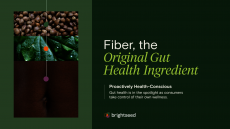Fibre could halve young women's breast cancer risk, says study
cut their risk of breast cancer by 52 per cent, says a UK-based
epidemiological study.
In a study of 35,792 women aged between 35 to 69, it was found that high fibre intake, particularly fibres from cereal and fruit, was associated with a significant reduction in the risk of breast cancer amongst pre-menopausal women. No such protective effect was observed in post-menopausal women, however.
"Previous research hasn't shown a convincing link between increased dietary fibre and a lower risk of breast cancer. But earlier studies didn't draw any distinction between pre- and post-menopausal women. Our study found no protective effect in the older group, but significant evidence of a link in the pre-menopausal women," said lead author Janet Cade from the University of Leeds.
Over one million women worldwide are diagnosed with breast cancer every year, with the highest incidences in the US and the Netherlands. China has the lowest incidence and mortality rate of the disease.
The National Cancer Institute estimates that 13 percent of American women will develop breast cancer during their lives.
The UK Women's Cohort Study (UKWCS) assessed dietary intakes of the women using a self-administered 217-item food frequency questionnaire (FFQ). Over a mean follow-up of 7.5 years, 350 cases of invasive breast cancer were diagnosed in post-menopausal women and 257 cases in pre-menopausal women.
After dividing the women into five groups (quintiles) according to their fibre intakes, the researchers calculated that an average daily intake of 30 grams or more of total fibre was associated with a 52 per cent lower risk of breast cancer in pre-menopausal women, compared to pre-menopausal women with a daily intake of 20 grams or less.
The average person in the UK is reported to eat about 12 grams a day.
Strong relationships were also observed for cereal and fruit fibre intakes. The upper quintile of cereal fibre intake (13 or more grams per day) was associated with a 41 per cent breast cancer risk reduction, compared to the lowest quintile intake (four or less grams), while 6 or more grams per day of fruit fibre was associated with a 29 per cent breast cancer risk reduction, compared to two or less grams per day.
"This is the first large prospective study to show a relationship between total fibre intake and risk of pre-menopausal breast cancer," wrote Cade in the International Journal of Epidemiology.
"Our results are particularly informative because they also show that fibre from cereals and potentially also from fruit may be the important sources of fibre resulting in this inverse relationship with breast cancer pre-menopausally," she wrote.
The researchers suggested several possible reasons for the apparent risk reductions amongst pre-menopausal women, including a potential role for antioxidant nutrients in high fibre foods that have protective properties against reactive oxygen species (ROS). They also suggested that fibre may smooth out the peaks and troughs in insulin levels in the body, with high insulin levels being proposed as a potential cause of cancer.
A third potential explanation could be the role played by the female hormone oestrogen in the development of breast cancer, they said. Previous studies have reported that dietary fibre may regulate oestrogen levels in the body. This effect would be especially relevant to the pre-menopausal group who naturally have far higher levels of the hormone, said the researchers.
"We don't yet know at which point in life dietary habits impact on a woman's susceptibility to breast cancer. The relevant exposure may be earlier in life, explaining why the protective effect was not shown in the post-menopausal group," said Cade.
Commenting independently on the research, Ed Yong, cancer information officer at British charity Cancer Research UK, said: "Until now, the evidence that fibre could reduce the risk of breast cancer has been inconsistent. This study suggests that this is because any protective effects are limited to women before their menopause.
"The study further highlights the importance of eating a healthy diet for reducing the risk of cancer," said Yong.
"Cancer Research UK already advises eating a diet rich in fibre to reduce the risk of bowel cancer. This study suggests that it could help protect against breast cancer in younger women too."
Source: International Journal of Epidemiology Published on-line ahead of print; doi:10.1093/ije/dy1295 "Dietary fibre and risk of breast cancer in the UK Women's Cohort Study" Authors: J.E. Cade, V.J. Burley, D.C. Greenwood et al.












